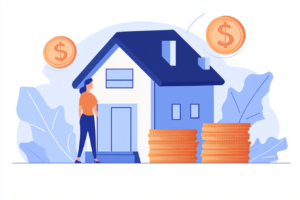Taking out student loans is a reality for most Americans. In fact, over 43 million people have taken out upwards of 1.76 trillion dollars in student loans as of 2023.
While no one likes to think about paying off said student loan debt, it is a critical and often daunting task that millions of people face after completing their education.
We aim to provide you with a clear roadmap towards effectively managing and eliminating your student loan burden. With detailed explanations and actionable advice, we will empower you to navigate this financial challenge confidently and pave the way towards a brighter, debt-free future.
Understanding Student Loan Debt
Before delving into strategies for paying off student loan debt, it is crucial to grasp the concept itself. Student loan debt is the amount of money borrowed to finance educational expenses, including tuition, books, and living costs. This debt must be repaid over a defined timeframe, often with added interest. Thankfully, student loans have some of the lowest interest rates out there, with an average of between 5.8-6.36%; in comparison, credit card interest rates can be over 20%.
By understanding the ins and outs of your student loans, you can take control of your financial situation by making informed decisions.
Assessing Your Loan Landscape
You must first evaluate your loan portfolio to tackle your student loan debt effectively. Begin by compiling a comprehensive list of all your loans, noting important details such as interest rates, repayment terms, and monthly payment amounts. You can formulate a personalized repayment strategy that maximizes your progress by gaining a clear overview of your loans.
Choosing the Best Repayment Plan

Student loan repayment options can vary depending on your loan type and circumstances. Explore various repayment plans, such as standard, income-driven, or extended plans, to determine which aligns best with your financial goals and capabilities. Be sure to consider factors such as monthly payment amounts, repayment duration, and potential interest savings when making your selection.
Prioritizing Repayment Strategies
To expedite your student loan debt payoff, consider prioritizing your repayment strategies. Utilize the “avalanche” or “snowball” method, both proven techniques for accelerating repayment. The avalanche method targets loans with the highest interest rates first, while the snowball method emphasizes paying off loans with the smallest balances first. Choose the approach that aligns with your financial circumstances and goals, and diligently adhere to your repayment plan.
Seeking Forgiveness or Loan Assistance Programs
You may be eligible for loan forgiveness or assistance programs depending on your profession or circumstances. Explore options such as Public Service Loan Forgiveness (PSLF), Teacher Loan Forgiveness, or income-based repayment plans, among others. Familiarize yourself with the necessary requirements and take advantage of any programs that can help alleviate or eliminate your student loan debt.
Supplementing Income and Reducing Expenses
Accelerating your student loan debt payoff can be achieved by supplementing your income and reducing expenses. Consider taking on side gigs, freelancing, or part-time jobs to increase your cash inflow specifically for debt repayment. Simultaneously, scrutinize your budget, identifying areas where you can reduce discretionary spending and optimize your savings. Every dollar saved and earned can significantly impact your ability to pay off your loans faster.
Maximizing Windfalls and Bonuses
Windfalls, such as tax refunds or work-related bonuses, can provide excellent opportunities to make substantial progress in paying off your student loan debt. Rather than squandering unexpected cash influxes, utilize these funds directly towards loan repayment. You can significantly reduce the principal balance and save on future interest charges by strategically allocating extra funds to your loans.
Staying Motivated and Celebrating Progress
Paying off student loan debt is a marathon, not a sprint. Celebrate your progress by establishing milestones and rewarding yourself appropriately whenever you achieve them. Track your progress regularly and reflect on how far you’ve come, cultivating the motivation to persist through the journey to financial freedom.
FAQs about Student Loans Debt
Below are a few commonly asked questions regarding student loan debt.
- When do I need to start repaying my student loans?
Federal student loans usually have a six-month grace period after you graduate, leave school, or drop below half-time enrollment. Private loans vary by lender, and it is always best to check before signing any paperwork to understand your specific repayment terms.
- What repayment plans are available?
Several federal repayment plans include Standard, Graduated, and Income-Driven Repayment Plans. Private lenders have their own repayment options.
- Can I defer my student loan payments?
Both federal and some private student loans allow for deferment or forbearance under specific circumstances, like financial hardship or going back to school.
- Is loan forgiveness available?
Some federal loans may be eligible for Public Service Loan Forgiveness or Teacher Loan Forgiveness, among other programs. Private loans typically do not offer forgiveness.
- How do I know if I qualify for loan forgiveness?
Qualifications for loan forgiveness depend on the specific program. Generally, you must meet certain employment criteria and make a set number of payments.
- What’s the difference between consolidating and refinancing?
Consolidation combines multiple federal loans into one while refinancing replaces one or more loans (federal or private) with a new, often lower-interest, loan.
- Is it a good idea to refinance my student loans?
Refinancing can lower your interest rates, but you may lose federal protections and benefits. It’s essential to weigh the pros and cons.
- What happens if I miss a payment?
Missing a payment can result in late fees and negatively affect your credit score. If you miss several payments, your loans may go into default.
- What are the consequences of defaulting on a student loan?
Defaulting can lead to severe consequences, including wage garnishment, tax refund seizures, and legal action.
- Can student loans be discharged in bankruptcy?
It’s rare but possible. You’ll need to prove that repaying the loan would cause “undue hardship.”
- Are student loans taxable?
Generally, student loans themselves are not considered taxable income. However, forgiven or canceled debt may be considered taxable.
Paying off student loan debt may seem insurmountable, but you can conquer this financial burden with knowledge and a well-crafted repayment strategy. Remember, staying motivated and recognizing your accomplishments are key elements of maintaining focus and achieving your goal of paying off your student loan debt once and for all.
You might also be interested in: 4 Types Of Loans For Bad Credit & 3 Great Options To Consider







